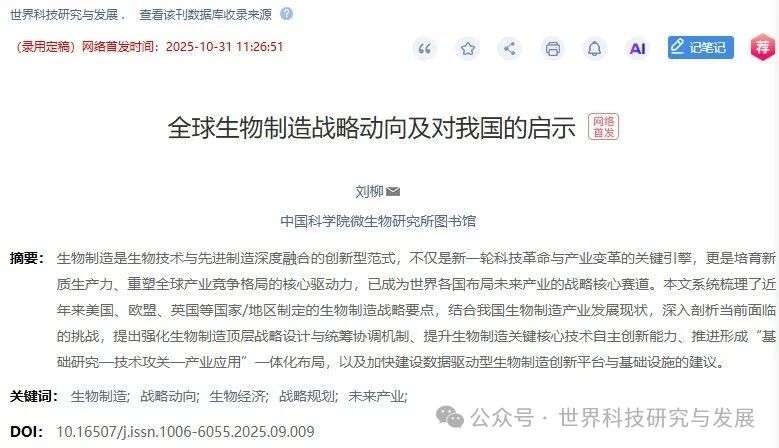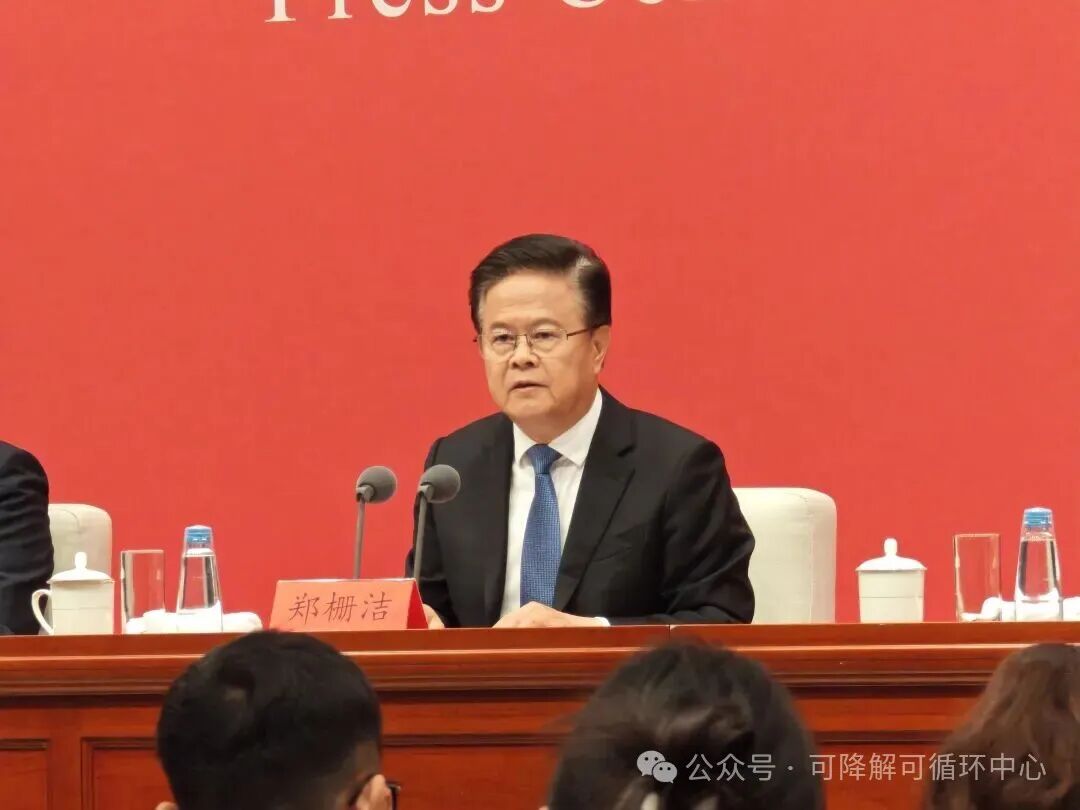Liu Liu
(Institute of Microbiology, Chinese Academy of Sciences, Beijing 100101)
Abstract: Biomanufacturing is an innovative paradigm that integrates biotechnology and advanced manufacturing. It is not only a key engine for the new round of scientific and technological revolution and industrial transformation, but also a core driving force for cultivating new quality productive forces and reshaping the global industrial competition landscape. It has become a strategic core track for countries around the world to layout future industries. This paper systematically reviews the strategic key points of biomanufacturing formulated by countries such as the United States, the European Union, and the United Kingdom in recent years. Combined with the current development status of China's biomanufacturing industry, it deeply analyzes the current challenges and proposes suggestions such as strengthening the top-level strategic design and coordination mechanism of biomanufacturing, enhancing the independent innovation ability of key core technologies in biomanufacturing, promoting the formation of an integrated layout of "basic research - technology breakthrough - industrial application", and accelerating the construction of data-driven biomanufacturing innovation platforms and infrastructure.
Key words: Biomanufacturing; Strategic Trends; Bioeconomy; Strategic Planning; Future Industries

Biological manufacturing relies on living organisms or their components (enzymes) as production systems and is an industrial technology that produces goods, provides services, or develops new processes on a commercial scale. It is also regarded as a platform technology that can transform the value chains of multiple key economic sectors. It has the characteristics of being clean, efficient, and renewable. In the future, it will restructure the production routes of traditional chemical engineering, replace the traditional methods of obtaining natural products, and disrupt traditional agricultural cultivation models. It is believed to have the potential to lead the "Fourth Industrial Revolution". Biological manufacturing, with its unique advantages of being green and low-carbon, is reshaping the traditional industrial system through raw material substitution, process innovation, and product innovation, and is giving rise to a series of new biological economic新业态 and new models, providing a powerful "green engine" for global sustainable development.
In recent years, global climate change has intensified, environmental crises have increased, and shortages of energy and resources have become increasingly severe, making the traditional industrial manufacturing industry based on long-term fossil resources face a green and low-carbon transformation of its development model. Against this backdrop, as a key technology field of strategic emerging industries, synthetic biology technology has driven the global biological manufacturing technology into a high-speed development stage, giving rise to a large number of high-quality industrialization achievements, and successfully applied to core industrial manufacturing fields such as chemical engineering, feed, materials, food, and energy. Biological manufacturing is not only the foundation of the biological economy but also an engine for promoting the commercial-scale release of biotechnological innovations, with a market size reaching trillions of dollars, becoming a competitive hotspot for countries around the world.
1 International Strategic Planning and Layout of the Biomanufacturing Field
In recent years, the global biomanufacturing field has shown a rapid development trend. Major economies around the world regard biomanufacturing as the core driving force for the development of the future biological economy and actively formulate or update biomanufacturing strategies and long-term plans, seeking competitive advantages in the field of biomanufacturing.
1) The United States: Strengthening the Security of the Entire Biomanufacturing Chain
The United States has long held a leading position in the field of biomanufacturing, and its policy planning maintains a strong continuity. The layout closely revolves around consolidating technological leading advantages and strengthening the security of the industrial chain. On September 12, 2022, the then US President Biden issued the "Executive Order on Promoting Biotechnology and Biomanufacturing Innovation to Achieve a Sustainable, Safe, and Reliable American Biobusiness", aiming to promote US biotechnological innovation and enhance domestic biomanufacturing capabilities; on September 14, the National Biotechnology and Biomanufacturing Initiative (NBBI) was launched, with various government departments and institutions assigned approximately 40 tasks and announced an investment of more than 2 billion US dollars to advance the plan, focusing on biotechnology and biomanufacturing, to provide innovative solutions for global challenges such as human health, climate change, energy, food, agriculture, and supply chain construction. The plan mainly includes: in the field of biology and health, relying on biotechnology to upgrade and strengthen supply chain resilience, among which the Department of Health and Human Services plans to invest 40 million US dollars to strengthen the production system of key drug raw materials such as active pharmaceutical ingredients, antibiotics, and epidemic response drugs; in infrastructure construction, the Department of Defense plans to invest 1 billion US dollars over five years to build national biomanufacturing infrastructure, break through the manufacturing bottlenecks of key chemicals and other important products, and enhance domestic biomanufacturing capabilities; the BioFabUSA Institute for Biomanufacturing Innovation builds BioFab factories to help bioproducts accelerate market transformation; the National Institutes of Health expands the data ecosystem of cancer research through the "Cancer Moonshot Program", encourages data sharing, and promotes the development of new therapies and the implementation of personalized cancer treatment; The National Science Foundation (NSF) has invested 20 million US dollars to launch a new project for the biological science data center, supporting research on small-scale life systems and facilitating the development of new biotechnologies for the production of products and related raw materials in fields such as agriculture, medicine, and health. These technologies will be used to promote sustainable economic growth.
After the issuance and implementation of the executive order, relevant departments have introduced a series of measures. In March 2023, the Office of Science Policy at the White House released the "Grand Goals for Biotechnology and Biomanufacturing" report, outlining the latest vision of the US government for promoting domestic biotechnology and biomanufacturing research and development. This report was developed by the US Department of Energy, Department of Agriculture, Department of Commerce, Department of Health and Human Services, and NSF around the theme of promoting social goals through biotechnology and biomanufacturing research and development. It specifically covers five aspects: climate change response plans, food and agricultural innovation, supply chain resilience, human health, and cross-frontier promotion, involving 21 topics and 49 specific goals, and planning future development goals and key directions. In terms of biomanufacturing data, the Office of Science Policy at the White House issued the executive order "Data Vision, Requirements, and Proposed Actions for the Biobased Economy Initiative" in December 2023, elaborating on the strategic blueprint for driving national biobased economy development through data-driven approaches, emphasizing the important supporting role of high-quality biological data sets in areas such as human health, climate change, energy and food security, agricultural production, and supply chain resilience, and pointing out the necessity of building a complete data infrastructure, standardizing data, and making strategic investments in data resources.
After Trump's re-election in 2025, the US government made a series of policy adjustments for biomanufacturing, especially in the biomedical field, with the core goal of continuing the 13944 executive order signed during his first term, by providing greater support for domestic drug manufacturing to reduce dependence on foreign sources and consolidate the security of the domestic supply chain. These measures mainly include continuously promoting the layout of domestic drug manufacturing, strengthening overseas production supervision, and using tariff adjustment measures to encourage the return of the pharmaceutical industry. Specifically, in May 2025, the Trump administration signed the executive order "Relaxing Regulation to Promote Domestic Key Drug Production", requiring the US Food and Drug Administration (FDA) to optimize the drug approval process, strengthen supervision of overseas production facilities, and accelerate environmental approval processes related to drug production, aiming to accelerate the return of US drug manufacturing and enhance the production capacity of domestic prescription drugs and their key active ingredients. In September 2025, the US government further issued the executive order "Modifying the Scope of Preferential Tariffs and Establishing a Procedure for Implementing Trade and Security Agreements", with the core being the adjustment of the scope of import tariff exemptions, including generic drugs and their raw materials, and whether they can be exempted depends on whether the trading partner has reached a compliant trade and security agreement with the US.
2) EU: Driving Green and Digital Transformation through Biomanufacturing
The EU attaches great importance to the development of biotechnology and biomanufacturing industries and has formulated a series of targeted action plans aimed at promoting the modernization of agriculture, forestry, energy, food and feed, and industry, helping to build a more competitive and resilient EU, and promoting green and digital transformation.
In 2005, the EU launched the "Vision for Industrial Biotechnology 2025", aiming to promote the transformation of the EU to a biotechnology-based society, reducing dependence on fossil resources, and enhancing the sustainable development capabilities and global competitiveness of the industry. In 2012, the EU established the European Synthetic Biology Research Area Network (ERASynbio) to enhance the core competitiveness of Europe in synthetic biology. ERASynBio released "The Next Steps for EU Synthetic Biology - Strategic Vision" in 2014, clearly outlining the strategic path for the development of synthetic biology in the EU over the next 5-10 years. In recent years, the EU has systematically promoted the development of industrial biotechnology and synthetic biology through plans such as "Horizon 2020" and "Horizon Europe", covering top-level strategic design, continuous funding support, project deployment across the entire innovation chain, and infrastructure and platform construction.
In May 2023, the European Bioindustry Association released the report "2023 BioManufacturing Policy Summit", explaining the strategic goals, policy framework, and regulatory mechanisms of the European bio-manufacturing industry, and further proposing 10 action recommendations aimed at outlining the future cooperation and action roadmap for the association, members, and stakeholders: (1) Elevate bio-manufacturing to a strategic level, affirming its significant potential for cross-sector application, and incorporating it into the core development areas of multiple strategies such as industry, medicine, bioeconomy, and green agreements; (2) Strengthen coordination at the policy level to ensure effective alignment between research and development priorities, industrial development directions, and commercial applications; (3) Enhance consistency in the legislative process to improve policy implementation efficiency; (4) Promote the transformation of the regulatory system and resource allocation towards a product-oriented standard; (5) Strengthen the construction of bio-manufacturing capabilities to enhance medical emergency capabilities and supply chain stability; (6) Promote the transformation of European innovation achievements into high-value-added businesses, with a focus on supporting the development of startups and small and medium-sized enterprises; (7) Build a comprehensive skills training system to ensure the accessibility of retraining and skills improvement resources in all member states; (8) Create a fair competitive environment globally to support the promotion of sustainable bio-manufacturing processes and products; (9) With policy and strategic support, clarify the growth targets of bio-manufacturing in the EU economy and quantify its economic, social, and environmental contributions in various fields; (10) Focus on the constraints and weak points in the bio-manufacturing industry, and carry out technological breakthroughs.
In March 2024, the European Commission released the report "Building a Future with Nature: Promoting the Development of EU Biotechnology and Bio-Manufacturing", proposing a series of actions to promote biotechnology and bio-manufacturing, including: Utilizing biotechnology research to promote innovation, accelerating the development and application of industrial biotechnological innovations and synthetic biology accelerators; Stimulating the demand and market absorption of bio-manufacturing products; Simplifying biotechnology regulatory pathways; Promoting public and private investment; Strengthening biotechnology-related skills; Developing and updating standards; Supporting collaboration and synergy; Promoting participation and international cooperation; Utilizing artificial intelligence and generative artificial intelligence; Reviewing the bioeconomy strategy.
3) United Kingdom: Actively Building an Engineering Biotechnology Ecosystem
The UK's bio-manufacturing development focuses on top-level design and long-term strategy. Through continuous release of roadmaps and major plans, it supports the research and development of key technologies in synthetic biology and infrastructure construction, promoting the development of engineering biology, in order to consolidate its global technological competitiveness. In 2012, the Department for Business, Innovation and Skills of the UK established the Synthetic Biology Leadership Council. The council released the "UK Synthetic Biology Roadmap", setting a 2030 roadmap for synthetic biology development in the UK and proposing five core themes. In the same year, the UK government launched the "Synthetic Biology for Growth Programme" (The Synthetic Biology for Growth Programme), investing 7 million pounds in six synthetic biology research centers, including the Molecular Biology Laboratory of the UK Medical Research Center, to support the accelerated development of synthetic biology. In 2016, the Synthetic Biology Leadership Council further launched the "UK Synthetic Biology Strategic Plan", setting a development goal of creating a market worth tens of billions of euros by 2030. In May 2023, the British government launched a life science growth plan worth 650 million pounds. In the field of life science manufacturing, 38 million pounds was allocated for a special fund for biomanufacturing to support projects that enhance the UK's future epidemic response capabilities; through the "Innovation UK" pharmaceutical manufacturing transformation plan, 10 million pounds was provided to support pharmaceutical manufacturing innovation for "health resilience" in the UK; 154 million pounds was invested to establish new facilities in Manchester Science Park, expand the UK's biological database, and facilitate scientific discoveries in the field of human health. In December of the same year, the Department of Science, Research and Innovation of the UK launched a 2 billion-pound 10-year strategic plan, "National Vision for Engineering Biology", aiming to promote the development of engineering biology and research and development of new medical therapies, crop varieties, environmentally friendly fuels and chemicals.
4) Canada: Building an Engineering Biology Network to Boost Industrial Upgrading
Canada's layout in the field of biomanufacturing focuses on top-level design and public-private collaboration. By building a networked platform, it effectively integrates resources from industry, academia, institutions, associations and government partners. Its strategy focuses on promoting the modernization of biomanufacturing and the development of life science industries, with a particular emphasis on low-carbon biomanufacturing, food security and health technologies, and through significant funds to strengthen infrastructure, vaccine research and production capacity building, aiming to enhance economic resilience, reduce import dependence and improve the ability to respond to public health crises.
In 2019, the National Engineering Biology Steering Committee of Canada was established. The committee created the engineering biology network Can-DESyNe - consisting of nearly 90 large and small companies, academia, institutions, associations and government partners, dedicated to applying biodesign and biotechnological processes to the fields of health, agriculture, food and industrial products. Can-DESyNe provides a launch platform for Canada's sustainable economic recovery, through leading public-private partnerships, supporting Canadian biotechnology development, biomanufacturing employment and economic growth, and providing indispensable impetus for its biological revolution. In 2020, the committee released the "Engineering Biology White Paper: Economic Recovery and Modernization of Biomanufacturing" report, aiming to promote Canada's knowledge-based economic development through engineering biology, with a focus on low-carbon manufacturing (biomaterial and mineral circular bioeconomy), food security (protein biomanufacturing), and advanced engineering health technologies (advanced biological products).
In July 2021, with the goal of developing cutting-edge biomanufacturing technologies, enhancing the competitiveness of the domestic life science sector and building a resilient health system, the Canadian government launched the "Biomanufacturing and Life Science Strategy", aiming to enhance Canada's preparedness against pandemics and promote the development of the domestic life science sector. This strategy clearly defines five priority areas: strengthening coordination governance efficiency, improving the research system and talent梯队 construction, focusing on key areas to empower business growth, improving public service capabilities, and promoting world-class technological innovation supervision.
5) Japan: Deeply Exploiting the Market Potential of the Biobusiness
The biobusiness is a core strategic industry in Japan, and has become a key engine for its economic growth. After years of continuous development and policy support, Japan has firmly ranked among the world's leaders in biotechnology. Its biological strategic plan (2019) aims to build "the world's most advanced biological economy society" as the overall goal, with the core of concept leadership and highlighting data-driven and international openness. The upgraded biological economic strategic plan (2024) further clarifies the market-oriented orientation, focusing on three core areas: biological manufacturing, primary industries, and health care, and quantifies the market targets for the sub-sectors of the biological economy.
In June 2019, Japan released "Biological Strategy 2019 - Formation of an International Biological Community", clearly stating the overall goal as "to build the world's most advanced biological economy by 2030". It specifically includes the following three aspects: First, establish the concept of prioritizing biology, considering relevant issues such as bio-technology ethics, law, and society, and giving priority to using bio-technology to promote the construction of an "super intelligent society", through the development of sustainable industries and circular economy, to activate the driving force of social development; Second, build a globally leading-level biological community, deeply integrating the concept of prioritizing biology into management decisions and government governance, through international cooperation, cross-domain integration to drive open innovation, effectively gathering global data, talents, funds and scientific research resources; Third, build a biological data-driven system, construct a data foundation that deeply integrates biology and digital technology, fully utilize the value of biological activity data, empower scientific research and industrial upgrading, systematically integrate production resources, establish international standards, and build a world-class demonstration country for biological big data applications by 2030.
In June 2024, the Japanese government upgraded "Biological Strategy 2019" to "Biological Economy Strategy", through stimulating private investment, proposing the goal of achieving a 100 trillion yen market size by 2030. The government has delineated five market areas and formulated supporting goals and measures, among which the fields of biological manufacturing and bio-based products, primary production such as agriculture, forestry and fishing, and health care fields such as biomedicine and regenerative medicine constitute the three core pillars of the strategy implementation. In the field of biological manufacturing and bio-based products, the target market size in 2030 is 53.3 trillion yen, the total annual investment scale of the public and private sectors in the biological manufacturing field is increased to 3 trillion yen, and about 200 million tons of biomass plastic is introduced.
6) South Korea: Elevating Synthetic Biology to a National Strategic Technology
To promote the development of synthetic biology, the South Korean government has included it in the key category of national strategic technologies, through top-level design to strengthen the innovation ability and industrial competitive advantage in biomanufacturing. The core of its strategic layout lies in building infrastructure for biological factories, focusing on key synthetic biology technology directions such as AI-driven DBTL cycles, genome design, and large-scale biomanufacturing, ultimately promoting the transformation of petroleum-based manufacturing to biomanufacturing. In November 2022, the Ministry of Science and ICT of South Korea officially released the "National Synthetic Biology Initiative", establishing the core vision of "developing synthetic biology and accelerating national biomanufacturing innovation", and proposing four specific goals: First, by 2030, the level of synthetic biology technology reaches 90% of the global highest level; second, within the next ten years, achieve a 30% biotransformation rate in the manufacturing sector; third, build the world's top-level biomanufacturing factory (Bio Foundry), build an automated infrastructure for synthetic biology research; fourth, concentrate on cultivating six strategic fields of synthetic biology.
The Ministry of Science and Information and Communication Technology of South Korea further deepened the synthetic biology layout in 2023 and released the "Strategic Development and Promotion Strategy for Core Synthetic Biology Technologies". This strategy carries out specific action plans for building a country with leading synthetic biology technology, clearly covering the technical development roadmaps of six fields, plans to implement nine research projects to comprehensively enhance the country's synthetic biology technology level, and reaffirms the vision of "achieving 30% biotransformation of petroleum-based manufacturing by 2030". The six key research fields include: (1) New functional biomolecules (genes, nucleic acids, proteins, etc.) design technology; (2) Biomechanical circuits, metabolic circuits, etc. design technologies of organisms; (3) Core components and DNA/RNA synthesis, combination, editing and decoding technologies; (4) Optimization technologies of artificial cells, in vitro biological manufacturing systems; (5) Ultra-parallel ultra-high-speed analysis and AI-based DBTL (Design - Build - Test - Learn) automation technology; (6) Biomanufacturing engineering control and large-scale production technology.
2 Analysis of the current development status of biomanufacturing in China
Biomanufacturing holds great potential. It is predicted that by 2035, 35% of petrochemical and coal chemical products can be gradually replaced by biomanufacturing products. As a strategic emerging industry in China and an important means to enhance new quality productivity, from the national level to local levels, the accelerated layout stage has been entered.
1) Biomanufacturing is included in the government work report Build several strategic emerging industries such as biomanufacturing, and accelerate the transformation and upgrading of traditional industries. The 2024 Government Work Report further proposed to vigorously promote the construction of modern industrial systems and accelerate the development of new productive forces. Actively cultivate emerging and future industries. Accelerate the development of cutting-edge emerging fields such as hydrogen energy, new materials, and innovative drugs, and actively create new growth engines such as biomanufacturing. It is worth noting that biomanufacturing, as an emerging industry, has been included in the government work report for the first time, fully demonstrating the country's high attention and strong support for this field.
2) Incorporate biomanufacturing into the overall planning, and accelerate infrastructure construction
To strengthen strategic and forward-looking research on China's bioeconomy, in December 2021, the National Development and Reform Commission released the "14th Five-Year Plan for the Development of Bioeconomy", which clearly set the development goal that the strategic position of biomanufacturing and other strategic emerging industries in the national economic and social development will be significantly enhanced; In the field of frontier biological technology innovation, efforts are made to promote synthetic biology technological innovation, break through key technologies such as the computational design of biomanufacturing strains, and promote their application in new drug development, disease treatment, agricultural production and other fields; Cultivate and strengthen competitive innovative entities in biomanufacturing and other fields. In terms of platform construction, as of June 2023, 23 national bio-industry bases have been built across the country. In July 2023, the National Development and Reform Commission approved the establishment of China's first national industrial innovation platform for biomanufacturing - the National Biomanufacturing Industry Innovation Center. This center is led by the Shenzhen Advanced Institute of Technology of the Chinese Academy of Sciences, jointly created by central enterprises, state-owned enterprises and leading private enterprises.
3) Biomanufacturing industry development empowers the transformation and upgrading of various industries
The state has continuously introduced special policy measures to fully ensure the stable and healthy development of the biomanufacturing industry. In January 2023, based on the national conditions of bio-based materials development in China, to implement the "storage of grain in technology" strategy, the Ministry of Industry and Information Technology issued the "Three-Year Action Plan for Accelerating the Innovation and Development of Non-Cereal Bio-based Materials", promoting the development of bio-based materials industries by utilizing non-cereal biomass such as agricultural waste and residues. In July of the same year, the Ministry of Industry and Information Technology and other departments jointly issued the "Light Industry Stabilization Growth Work Plan (2023-2024)", proposing to strengthen the top-level design of the biomanufacturing industry, increase investment in innovation resources, and enhance product competitiveness. Key points include expanding the application of non-cereal raw materials, breaking through low-cost saccharification technologies, and promoting sustainable development. Support regions to carry out pilot projects for bio-based materials and non-cereal bioenergy, and promote the large-scale application of active raw materials in food, cosmetics and other fields.
In December 2023, to accelerate the transformation and upgrading of traditional manufacturing industries, the Ministry of Industry and Information Technology and other eight departments issued the "Guiding Opinions on Accelerating the Transformation and Upgrading of Traditional Manufacturing Industries", stating that it is necessary to vigorously develop biomanufacturing, enhance core strain, high-performance enzyme preparation and other bottom-level technological innovation capabilities, improve the level of advanced separation and purification technologies, and promote the integration and application of biotechnology in food, medicine, chemical industry and other fields. In 2024, to promote the green development of manufacturing industries, the Ministry of Industry and Information Technology and other seven departments jointly issued the "Guiding Opinions on Accelerating the Promotion of Green Development of Manufacturing Industries", requiring to anticipate and layout future industries in the green and low-carbon fields of biomanufacturing, leveraging the environmental-friendly advantages of biomanufacturing such as strong selectivity, high production efficiency and less waste, and focusing on fields such as light industry fermentation, medicine, chemical industry, agriculture and food, to establish a biomanufacturing core strain and key enzyme creation technology system. In 2025, to promote the construction of pilot capabilities in biomanufacturing, the Ministry of Industry and Information Technology and the National Development and Reform Commission Office jointly issued policies, requiring to base on the current industrial situation and development needs, to layout corresponding pilot capabilities and service systems, and encourage national laboratories, national scientific and technological innovation platforms to create pilot capability construction platforms. 4) Vigorously promote the enhancement of biomanufacturing research and development capabilities
To fully implement the major strategic deployment of the country regarding carbon peak and carbon neutrality, and to support the realization of the "carbon neutrality" goal through scientific and technological innovation. In 2022, the Ministry of Science and Technology and nine other departments jointly released the "Implementation Plan for Supporting Carbon Peak and Carbon Neutrality through Science and Technology (2022-2030)", clearly deploying a number of cutting-edge low-carbon technology research tasks. These include three main directions: first, to break through green hydrogen production technology; second, to promote the development of carbon dioxide conversion technology; third, to tackle the research on the synthesis of green and renewable fuels. At the project deployment level, the Ministry of Science and Technology has continuously promoted a number of key national research and development programs, including "Synthetic Biology" and "Green Biomanufacturing", and has provided systematic support for the research and development in the fields of biotechnology and biomanufacturing in projects such as "Key Scientific Issues of Transformative Technologies", "Solid Waste Resource Utilization", and "Innovative Science and Technology for Blue Food Crops". In recent years, the underlying tools in the field of biomanufacturing in China have rapidly evolved and upgraded. Relying on the collaborative research and development system of industry-university-research, a number of major common key technical problems have been overcome, accelerating the industrialization process of biomanufacturing-related technologies.
3 Suggestions for the Development of Biomanufacturing in China
In recent years, significant breakthroughs have been made in research and innovation, as well as technology transfer, in the field of biomanufacturing in China. The biofermentation industry, which serves as a crucial support for this field, has developed into a leading and well-structured industry, laying a solid foundation for the large-scale development of the biomanufacturing industry. However, when compared with international advanced levels, there are still significant gaps in key aspects such as top-level strategic design, the ability to independently supply core biological catalysts, raw material conversion efficiency, the depth of key technology breakthroughs, and the independent research and development of high-end equipment and infrastructure construction. These gaps prevent the industry from fully meeting the development demands for upgrading to high-end, green, and intelligent levels, and thus, it is urgent to systematically optimize the development path at the strategic level.
1) Strengthen top-level strategic design and coordination for biomanufacturing
Most developed countries have incorporated biomanufacturing into their national bioeconomy core strategies or specific development plans. By increasing research investment intensity and improving the industrialization policy system, they accelerate the transformation of technological achievements into industries. Biomanufacturing, as a key development direction of China's bioeconomy, is a "green engine" driving the optimization and upgrading of the industrial structure, and a key area for cultivating new quality productive forces. However, China has not yet issued a top-level strategic design document for biomanufacturing. Therefore, it is necessary to further strengthen the overall planning and layout of the biomanufacturing strategy at the national and local levels: First, based on the dual carbon goals and sustainable development needs, formulate a national medium- and long-term development plan for biomanufacturing, clearly define the goals for each stage, summarize key tasks, prioritize development directions, and formulate guarantee measures, promoting the wide application of biomanufacturing in fields such as medicine, agriculture, materials, and environmental protection; Second, establish a cross-departmental and cross-regional coordination mechanism for the development of biomanufacturing, comprehensively coordinate planning implementation, resource integration, and policy implementation, guide local differentiated layouts, avoid low-level redundant construction and resource waste, and build a healthy biomanufacturing industry ecosystem.
2) Enhance the independent innovation capabilities of key core technologies in biomanufacturing
Focusing on the technical bottlenecks that hinder the development of China's biomanufacturing industry, systematically sort out the key technology research and development list, and build a "industry-university-research-application" collaborative innovation system in key "cardboard" areas: First, integrate top domestic and international research forces, increase research investment, and form interdisciplinary joint research teams to focus on breaking through key core technologies such as chassis cell modification, core industrial strain construction, high-activity key enzyme preparation, bottom-level synthetic biology technology, genome editing and precise delivery technology, and AI-driven biomanufacturing; Second, rely on national major science and technology projects, national key research and development plans, and "two major" projects as national project carriers, accelerate the independent research and development and industrialization process of key technologies, and simultaneously build a strain resource library with independent intellectual property rights, a standardized biological component library, a multi-dimensional information database, and dedicated software tool chains, to lay a solid foundation for technological innovation; Third, seize the development opportunity of the deep integration of biotechnology and artificial intelligence, focus on supporting the research and development and application of cutting-edge technologies such as AI-assisted new drug development, computer-assisted enzyme molecule design, and intelligent bioreaction process optimization, and comprehensively enhance the innovation efficiency and international competitiveness of China's biomanufacturing industry.
3) Promote the integrated layout of "basic research - technology breakthrough - industrial application" in biomanufacturing
Taking the microbial manufacturing industry as the core driver, build a full-chain collaborative development system from laboratory to production line: First, adhere to the integrated deployment of basic research, key technology research and development, and industrial application demonstration, forming a closed-loop development model of "basic breakthrough - technology transformation - scenario verification - scale promotion"; 2) Fully leverage the leading role of national strategic scientific and technological forces (such as research institutes and key universities), deepen cooperation with leading enterprises, and build an efficient and coordinated industrial ecosystem of "research, industry, academia, application, capital" to integrate upstream and downstream resources of the industrial chain and unleash the synergy of innovation entities; 3) Promote the cluster development of bio-manufacturing, rely on key industrial parks to create characteristic clusters, form a full industrial chain supporting capability of technology research and development, equipment manufacturing, raw material supply, and product application, and provide solid support for national strategic goals such as "building a world science and technology power" and "Made in China 2035".
4) Build a data-driven innovation platform and infrastructure for bio-manufacturing
With the explosive growth of data in the field of life sciences, bio-manufacturing is entering a new stage of "data-driven innovation", which not only places higher requirements on data infrastructure but also injects new opportunities for industrial breakthroughs: 1) Strengthen the construction of data infrastructure for bio-manufacturing, carry out large-scale and high-throughput digital analysis of massive microbial resources, and explore new functional components, metabolic pathways, and chassis cells, providing data support for industrial innovation in fields such as new pharmaceutical molecules, new food raw materials, bio-based chemicals, and new materials; 2) Build a national data center in the field of bio-manufacturing with international first-class standards, establish a standardized system for data collection, storage, sharing, and security, and promote cross-domain and cross-entity data openness and sharing; 3) With data infrastructure as support, promote the implementation of innovative application scenarios for bio-manufacturing, lay a key foundation for the early layout of new quality productive forces in the field of bio-manufacturing, and help the industry seize the commanding heights of international competition.








